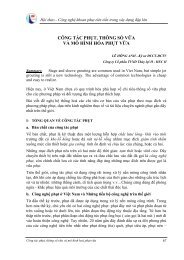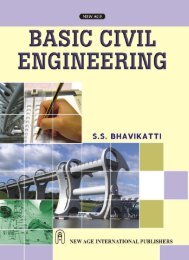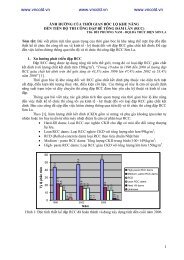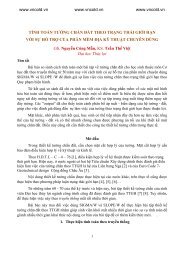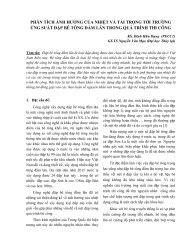Civil Engineering Project Management (4th Edition)
Create successful ePaper yourself
Turn your PDF publications into a flip-book with our unique Google optimized e-Paper software.
188 <strong>Civil</strong> <strong>Engineering</strong> <strong>Project</strong> <strong>Management</strong><br />
sub-contract. It is true that, under Clause 59(1) the contractor has to have a<br />
‘reasonable objection’ for refusing to employ a nominated sub-contractor, but<br />
this constraint is of little value in practice. There can also be refusal of either<br />
party to accept the other’s terms for payment – although Clause 59(7) of the<br />
ICE Conditions endeavours to protect a nominated sub-contractor by providing<br />
for direct payment to him if the main contractor fails to pay him.<br />
If the contractor or nominated sub-contractor will not enter a contract<br />
between them for any reason, the nomination fails. The engineer then has to<br />
nominate another sub-contractor, or ask the contractor to do the work himself<br />
or find his own sub-contractor. This mixing of responsibilities between the<br />
employer and main contractor for the performance of a nominated subcontractor<br />
leads to frequent disputes. If the nominated sub-contractor fails to<br />
do the work or goes into liquidation, the employer must take action without<br />
delay, since the main contractor has no duty to carry out the work himself<br />
and will claim for any delay in getting it done. Further, if the sub-contractor’s<br />
work proves unsuitable or not fit for its purpose, the main contractor will deny<br />
responsibility (unless he was expressly charged in the terms of the sub-contract<br />
to take such responsibility – which is unlikely) since he had no choice in the<br />
selection of the sub-contractor or the product.<br />
The extensive disputes which have arisen over the years on these matters,<br />
more particularly in building work with its wider use of nominated subcontractors,<br />
has led many engineers to take the view that use of nominated<br />
sub-contractors in civil engineering should be avoided wherever possible.<br />
The problems most often arise from late completion or defective performance<br />
by a nominated sub-contractor which affects the contractor or his other<br />
sub-contractors. A possible way to avoid this is to specify the work in detail,<br />
providing for its payment by measure under appropriate bill items. Or, if specially<br />
skilled or experienced workers are required to do the work, there is no<br />
reason why this cannot be specified by calling for particular craft skills and<br />
requiring evidence of same. Alternatively, if only one firm can provide the special<br />
techniques required, the letting of a separate contract for such work can be<br />
considered. Although the organization of separate contracts has to be efficiently<br />
managed (as described in Section 5.6), the advantage is that the engineer retains<br />
direct control over the specialist’s work and can act to avoid or solve problems<br />
arising from late delivery or defective work. Where a nominated sub-contractor<br />
is to supply only certain items, the employer may be persuaded to order the<br />
materials direct and store them in advance of being needed; or the contractor<br />
may be instructed to order them early and can be paid for offloading and<br />
storing them on site under items provided in the bill of quantities.<br />
15.9 Prime cost items<br />
When a nominated sub-contract is intended but not yet chosen, a prime cost<br />
item can be inserted in the bill of quantities by the engineer to cover the work








